.
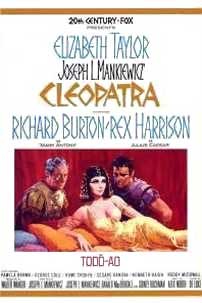
Poster, Cleopatra, 1963 Film
Cleopatra is a 1963 film directed by Joseph L. Mankiewicz. The screenplay was adapted by Sidney Buchman, Ben Hecht, Ranald MacDougall, and Joseph L. Mankiewicz from a book by Carlo Mario Franzero. The film starred Elizabeth Taylor, Richard Burton, Rex Harrison, Roddy McDowall and Martin Landau.
Cleopatra chronicles the struggles of Cleopatra, the young Queen of Egypt, to resist the imperialist ambitions of Rome.
Production
The film is infamous for nearly bankrupting 20th Century Fox. Originally budgeted at $2 million[1], it was made at a cost of $44 million -- more than $286 million in today's dollars . This was partly due to the fact that the film's elaborate, complicated sets, costumes and props had to be constructed twice, once during a botched shoot in London and once more when the production relocated to Rome.
Filming began in London in 1960. Mankiewicz was brought into the production after the departure of the first director (Rouben Mamoulian). He inherited a film which was already $5 million over budget and had no usable footage to show for it. This was partly due to the fact that the actors originally hired to play Julius Caesar (Peter Finch) and Marc Antony (Stephen Boyd) left due to other commitments. Mankiewicz was later fired during the editing phase, only to be rehired when no one else could piece the film together.
Elizabeth Taylor was awarded a record setting contract of $1 million. This amount eventually swelled to $7 million due to the delays of the production. Taylor became ill during the early filming, necessitating that the production be shut down. Production was moved to Rome after six months as the English weather proved detrimental to her recovery. During filming Taylor met Richard Burton and the two began a very public affair. The love affair between Taylor and Richard Burton made headlines worldwide. Moral outrage over the scandal brought negative publicity to an already troubled production.
The cut of the film which Mankiewicz screened for the studio was six hours long. This was cut in half by the time the film opened to allow theaters to increase the number of showings per day. Due to the cuts certain details are left out of the film, such as Rufio's death.[2] Mankiewicz unsuccessfully attempted to convince the studio to split the film in two in order to preserve the original cut of the film.
The arduous process and enormous cost of completing Cleopatra resulted in the end of the sword and sandal epic.
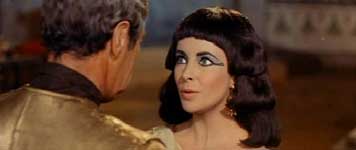
Cleopatra (Elizabeth Taylor) confronts Julius Caesar (Rex Harrison)
Synopsis
Spoiler warning: Plot and/or ending details follow.
The film opens with the defeat of Pompey at the Battle of Pharsalus. Caesar pardons the captured officers while the dead are cremated.
Pompey has fled the scene and makes his way by ship to Egypt, where he hopes to enlist the support of the young Pharaoh Ptolemy XIII and his sister Cleopatra. Pompey believes they will come to his aid as he was on good terms with their father.
Caesar follows Pompey to Egypt and arrives in Alexandria in early October, 48 BC. Ptolemy's advisors believe the Romans will fight their way to the palace, thus enraging the Egyptian people against them, but Caesar orders his retinue to put away their swords and instead shop their way through the crowd in the market. Caesar enters the palace and meets the boy Pharoah, along with his advisors, who seem to do most of the thinking for the Pharoah. As a gesture of 'goodwill' from the Egyptians, Caesar is presented with the severed head of Pompey, who Ptolemy had ordered killed because his advisors had said it would please Caesar. As Caesar settles in in the palace, Pollodorus arrives disguised as a rug peddler bearing what he says is a gift from Cleopatra. After dismissing his officers, Caesar unrolls the rug and finds Cleopatra concealed within. After a short, hostile but not altogether unenlightening conversation, Cleopatra leaves for her chambers with an escort of Roman soldiers. Later, however, she returns, escorted by Pollodorus, to a spyhole in the head of a Sphinx which is carved into one wall of Caesar's rooms and listens to Caesar's briefing about her from his generals.
She is still spying on Caesar when he dismisses his generals, then suffers from an epileptic seizure. Days later, in her baths, she has a heated audience with Caesar in which she demands access to her throne room and warns Caesar that her brother has surrounded the palace with his soldiers and that he is vastly outnumbered. Caesar demurs her warnings as factors already taken into consideration, and insists that he can hold the wall for the time being.
Caesar orders the Egyptian fleet burned so he can gain control of the harbor. The fire spreads to the city burning many buildings, including the famous Library of Alexandria. Cleopatra angrily confronts Caesar about the fire, but he refuses to pull Roman troops away from the fight with Ptolemy's forces. She rages at him, and somewhere in the middle of the fight, Caesar begins kissing her to silence her; it is obvious from their comments that he thinks to make her submissive to his will through sex. She vows he won't like her this way, but before he can respond, Ptolemy's troops attack one of the palace gates. The Romans succeed, and the armies of Mithradates arrives to reinforce the Roman legions.
The following day, Caesar passes judgment regarding the conflict between Ptolemy and Cleopatra. He sentences Ptolemy's lord chaimberlain to death for arranging an assassination attempt against Cleopatra, and rules that Ptolemy and his tutor shall be sent out to join Ptolemy's vastly outnumbered troops. Though not to be executed, it is certain that both will die. Cleopatra is crowned sole Queen of Egypt. Soon afterwards, Caesar marvels at the largesse Cleopatra has shown him, at the wealth of Egypt; they discuss their future together, and she tells him of her fertility and promises to bear him sons.
They later continue their discussion at Alexander's tomb. She dreams of ruling the world together with Caesar and informs her that she has become pregnant. Once his son is born, Caesar accepts him publicly, which becomes the talk of Rome and the Senate.
Caesar now returns to Rome for his triumph, while Cleopatra remains behind in Egypt. Two years pass before the two would see each other again. After he is made dictator for life, Caesar sends for Cleopatra to come to Rome. She arrives in Rome in a lavish procession, and wins the adulation of the Roman people. The Senate is growing discontent amid rumors that Caesar wishes to be made King, which is anathema to the Romans.
On the Ides of March, the Senate is preparing to vote to award Caesar additional powers. Despite warnings from his wife Calpurnia and Cleopatra, he is confident of victory and leaves for the Senate. Caesar is attacked as he makes his way to the Senate. He is stabbed by various senators and dies at the foot of a statue of Pompey.
After the funeral pyre, Octavian is named as Caesar's heir, not Caesarean, his son by Cleopatra. Realizing she has no future in Rome, Cleopatra returns home to Egypt. Caesar's assassins, among them Cassius and Brutus, are killed at the Battle of Philippi, and Marc Antony establishes a second triumvirate with Octavian and Lepidus, a politician with much power. They decide that the empire will be split between them: Lepidus will receive Africa, Octavian will take Spain and Gaul, while Antony will take control of the eastern provinces. The rivalry between Octavian and Antony is becoming apparent.
While planning a campaign against Parthia in the east, Antony realizes he needs money and supplies, and cannot get enough from anywhere but Egypt. After refusing several times to leave Egypt, Cleopatra gives in to his requests and meets him in Tarsus.
Cleopatra has prepared a lavish feast and a dance in honor of Bacchus. To this feast, she wears a collar of gold coins cast with Caesar's image. Telling Antony that she will return to Egypt at sunrise and warning him against playing in Tarsis while Octavian consolidates his power in Rome, Cleopatra watches him become drunker and drunker. She then signals a slave who has been costumed to be her double to emerge during the Bacchanalia and sneaks out when Antony pounces on the girl. When Antony realizes this, he goes to her chamber and tears down the curtain, demanding that she hear him, that she take him seriously for himself, rather than treat him forever as a shadow of the mighty Caesar. She softens to him, and they make love. It is later that she admits to having seen him during one of his tours in Egypt when she was a child, and having fallen in love with him then. Antony admits to having fallen in love with her during her procession into Rome for Caesar's coronation.
Octavian takes the opportunity to use their affair in his smear campaign against Antony. When Antony must later return to Rome to address the situation brewing there, Octavian traps Antony into a marriage of state to Octavian's sister, Octavia. Cleopatra flies into a rage when she learns of the marriage, feeling betrayed.
When he next sees Cleopatra, he is forced to kneel to her in public, and is humbled. She demands that a third of the Empire be awarded to Egypt in return for her aid. Antony acceeds to her request and divorces Octavia. Octavian clamors for war against Antony and his "Egyptian whore". The Senate votes for war and Octavian murders the Egyptian ambassador, Cleopatra's tutor Sosygines, on the Senate steps.
The war is decided at the Battle of Actium on the west coast of Greece. After pursuing what he believes to be Octavian's ship, he is trapped by Agrippa and his fleet is scuttled to a ship. Seeing Antony's ship burning, Cleopatra assumes him dead and orders the Egyptian forces home. When he realizes that Cleopatra is leaving without him, Antony is enraged and heartbroken. The pair return to Alexandria, where their romance is badly damaged by Antony's perception that Cleopatra abandoned him. Octavian's army is fast approaching, and Cleopatra somehow manages to convince Antony to retake command of his troops and fight Octavian. Antony's soldiers, however, have lost faith in him after Actium and abandon him during the night; Rufio, the last loyal man in Antony's camp, is killed. Antony tries to goad Octavian into single combat, but is finally forced to flee into the city.
When he returns to the palace, Cleopatra has already gone into hiding at her tomb. Pollodorus, not believing that Antony is worthy of his queen, tells Antony this in such a way that convinces Antony she is dead; he then falls on his own sword, believing he has lost everything. Pollodorus takes the dying Antony to Cleopatra, and he dies in her arms. Before she can even grieve him, however, Octavian's army captures the city and Cleopatra is brought before Octavian as a prisoner.
Octavian makes his intentions clear to Cleopatra: when he returns to Rome in glory, she will be his ultimate prize. He therefore urges her to swear that she will not harm herself. Cleopatra swears the oath, but not before noticing that Octavian wears Pompey's ring strung around his neck. It is the ring Caesar's daughter gave to Pompey, which was given to Caesar after Pompey's death, and he had in turn given it to his son before his return to Rome. Knowing that Caesareon has been killed, she makes the oath contingent on the life of her son. Octavian, not thinking that she would have any idea that her son is dead, agrees to the condition.
In her chambers, she gives her final orders to her handmaidens and makes preparations for her journey. Begging to be allowed to join her, her handmaidens bring her hand a basket of figs with an asp concealed within. Cleopatra slips her hand inside and is bitten. By the time Agrippa and Octavian come for her, both of her handmaidens have laid their Queen out properly, clothed in the golden costume she had worn during her entrance to Rome, and had been bitten by the asp as well. One is dead, and the other, dying. Octavian turns from the room, thwarted and enraged.
Agrippa demands: "Was this well done by your lady?" The dying servant replies: "Extremely well, befitting the last of so many noble rulers."
Reception and Impact
Cleopatra was not a box-office flop by any means, in fact the film grossed more than $23 million and was the highest grossing film of the year. This was, however, approximately half of the production cost. With such astronomical costs and the contemporary price of movie tickets, Cleopatra didn't have a chance of making a profit on its first run, and it took several years to break even, so that the financial loss from the film forced the studio to undertake drastic retrenchments. Supposedly, the film is still listed as a negative cost for Fox today, which means that, technically, the movie still has not made back its initial investment.
A contributing factor to the loss was the hype, both internal and public, which surrounded Cleopatra. Billed as the next great cinematic masterpiece, Fox continued to invest more and more money into the project, confident that audiences would adore it. Yet as production continued to falter, the top studio executives took much more direct and personal control of the project, further complicating the project. Films that were to be funded from the profits of Cleopatra were delayed or cancelled, further tying the fate of the studio to the one film. The extensive marketing campaign reflected how optamistic - or desperate - Fox was about the movie, releasing posters with new release dates every few months as production ground on.
When the film finally was released, the problems that had plauged production were finally fully evident. Historians criticized the inacurate depictions of Octavian as a weak-stomached yet power mad teenager and disliked the rewrite of how and why Juius Caesar was killed. Stage actors cited the disjointed script and directing styles as the root of the movie's problems. Critics found the acting to be over the top in many scenes, scoffing that it took a special class of film maker to get such great actors to act so badly. And as talented as the actors may have been, the extreme length and breadth of Cleopatra made it difficult for audiences to grasp the general plot and theme; the two halves tending to focus more on Julius Caeser and Mark Anthony, respectively, than on Cleopatra herself.
Part of the fallout of chaotic production was a shifting away from the traditional "studio-system" prevalent in Hollywood up to that time. While studios would continue to finance major films, financial burdens would increasingly be shifted onto independent production companies as a way to buffer the "parent" studio from a loss. Indeed the financial situation at Fox was so dire in the wake of Cleopatra that the studio executives were forced to sell most of the studio's large backlot in Los Angeles to developers. This area today forms the core of the Century City area in Los Angeles.
Trivia
The golden costume worn by Elizabeth Taylor during the famous 'Cleopatra enters Rome' procession was made from real gold, at a cost of about $1 million. It was so heavy that she could only wear it for short periods of time.
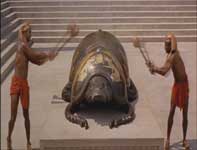
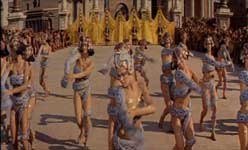
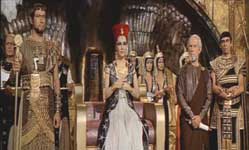

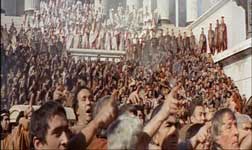
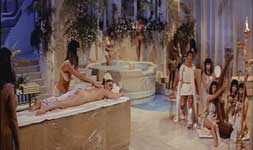
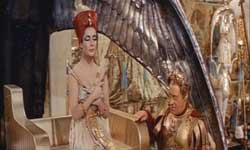

Cast
Elizabeth Taylor as Cleopatra
Richard Burton as Marc Antony
Rex Harrison as Julius Caesar
Roddy McDowall as Octavian
Martin Landau as Rufio
Hume Cronyn as Sosigenes
Andrew Keir as Agrippa
Kenneth Haigh as Brutus
George Cole as Flavius
Pamela Brown as the High Priestess
Cesare Danova as Pollodorus
Awards and nominations
1963 Academy Awards
- Won, Best Cinematography
- Won, Best Art Direction
- Won, Best Costume Design
- Won, Best Visual Effects
- Nominated, Best Picture
- Nominated, Best Actor
- Nominated, Best Film Editing
- Nominated, Best Original Score
- Nominated, Best Sound Mixing
1963 Golden Globes, USA
- Nominated, Best Motion Picture - Drama
- Nominated, Best Motion Picture Actor - Drama
- Nominated, Best Motion Picture Director
- Nominated, Best Supporting Actor
| Ancient Greece
Science, Technology , Medicine , Warfare, , Biographies , Life , Cities/Places/Maps , Arts , Literature , Philosophy ,Olympics, Mythology , History , Images Medieval Greece / Byzantine Empire Science, Technology, Arts, , Warfare , Literature, Biographies, Icons, History Modern Greece Cities, Islands, Regions, Fauna/Flora ,Biographies , History , Warfare, Science/Technology, Literature, Music , Arts , Film/Actors , Sport , Fashion --- |
Retrieved from "http://en.wikipedia.org"
All text is available under the terms of the GNU Free Documentation License

